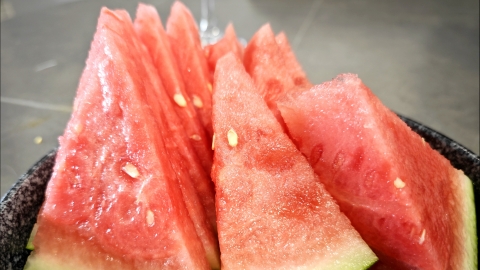Can grapes and watermelon be eaten together?
Under normal circumstances, grapes and watermelon can be eaten together, but it is important to consume them in moderation. A detailed analysis is as follows:

Grapes are rich in nutrients such as glucose, vitamin C, vitamin K, potassium, calcium, flavonoids, and resveratrol, and have functions such as replenishing blood and vital energy, benefiting the liver and kidneys, and promoting the production of body fluids. Watermelon contains large amounts of water, vitamin C, vitamin B6, potassium, and lycopene, an antioxidant, and has effects such as clearing heat to relieve summer heatiness, promoting diuresis to reduce swelling, and alleviating fatigue.
Grapes and watermelon each contain different nutrients, and when consumed together, they can complement each other nutritionally, providing more comprehensive nutritional support for the body. The flavonoids in grapes and the lycopene in watermelon both have antioxidant properties, which help protect cells from damage caused by free radicals. Both grapes and watermelon are rich in water and dietary fiber, which aid in promoting gastrointestinal motility and improving digestive function.
However, it is important to consume them in moderation, as excessive consumption may lead to elevated blood sugar levels or cause gastrointestinal discomfort. Diabetic patients should control their intake to avoid rapid increases in blood sugar; individuals with weaker digestive systems should avoid excessive consumption to prevent additional strain on the gastrointestinal tract. Grapes and watermelon can be consumed as fruits between meals or as desserts after meals. However, it is recommended to avoid consuming large amounts before bedtime, as this may affect digestion and sleep. It is advisable to focus on dietary diversity and balance in daily meals and avoid excessive intake of a single food or nutrient.









